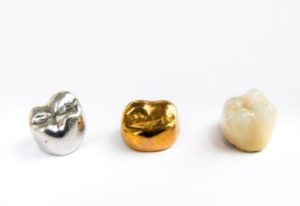 Does your dentist want you to get a crown? If so, then it’s a good idea to seriously consider his or her recommendation. Dental crowns are a great way to treat a number of oral health issues, including discolored, misshapen or even broken teeth.
Does your dentist want you to get a crown? If so, then it’s a good idea to seriously consider his or her recommendation. Dental crowns are a great way to treat a number of oral health issues, including discolored, misshapen or even broken teeth.
What’s a Dental Crown and Why Would I Need One?
As its name implies, a crown is a particular type of restoration that sits on top of a natural tooth. Its purpose is to protect both that specific tooth and your overall dental health from problems such as these:
- Tooth decay. A crown can often save a diseased tooth from ongoing damage and infection.
- Cracked or broken teeth. Your dentist may use a crown to restore lost functionality to a distressed tooth and protect it from further harm.
- Missing teeth. Crowns are often used to anchor a dental bridge, an oral appliance which in some cases can compensate for an absent tooth.
- Aftereffects of a root canal. A root canal removes infected material from the base of a tooth. But the tooth can still be lost over time unless it’s protected by a filling, crown or other restoration.
- Aesthetic issues. Sometimes a tooth is still structurally sound but suffers from cosmetic problems such as staining, yellowing or discoloration. A crown can hide these blemishes, giving the patient greater self-esteem.
Dental Crowns and Implant Therapy: a Winning Combination
One of the most exciting dental medicine developments in recent years is modern implant therapy. Dental implants provide a long-term replacement for missing teeth that avoids the drawbacks of dentures and other, more traditional forms of treatment.
But the implant itself is only part of the story. Regaining the appearance and functionality lost from a missing tooth requires adding a finishing restoration. In many cases a fully formed dental crown is the perfect choice. Modern crowns are virtually indistinguishable from natural teeth. They can last 10 years or longer with proper care on the patient’s part.
What Can I Expect during a Dental Crown Treatment?
The process of receiving a crown is safe and straightforward. The dentist will administer pain blockers and possibly a minor anesthetic to help you relax. He or she will shape the tooth and remove any damaged or infected sections.
The next step is to create a mold of the permanent crown. This process normally takes a week or two. Upon your return your dentist will fit this restoration to the tooth and use a quick drying dental adhesive to ensure its strength, taking care to ensure precise fit.
The average recovery time after receiving a dental crown is quite short, usually only a few days. In most cases over-the-counter analgesics such as acetaminophen or ibuprofen are more than sufficient for addressing any post-procedure discomfort
Dental crowns do require a reasonable degree of self-care on the patient’s part. This includes regular brushing and flossing, eating a sensible diet, adopting a tobacco-free lifestyle and seeing your dentist for periodic cleanings and checkups.
A dental crown is a proven way to put tooth pain behind you and get on with the rest of your life. Talk to your dentist soon about this gentle, effective approach to restoration.
About the Practice
Dr. Hooks welcomes you to their Altavista, VA dental practice. At Hooks Family Dentistry, we treat patients of all ages and warmly welcome you and your family to our clinic.
From dental treatments like fillings and root canals to cosmetic procedures like veneers and even preventative care like exams and cleanings, we do it all in a warm and friendly environment that will leave you smiling from ear to ear!
To schedule an appointment with our dental team, please visit our website, or call 434-215-0363 today!
